
The wonderful thing about being a kid is the absence of preconceived notions – no prejudices. Growing up with my ear glued to top 40 radio I liked everything I heard just by virtue of it being on the radio.
That was until my adolescence. But then the “cool factor” came in. Hendrix was cool. Clapton was cool Three Dog Night were cool, and so was Grand Funk, Deep Purple, James Taylor, Cat Stevens. It wasn’t cool to like, say, The Carpenters or Paul Anka or The Stylistics or The Spinners or Glen Campbell.
Or Charlie Rich.
Rich hit the top 40 big time in the summer of 1973 with Behind Closed Doors, and I could have done without him. To me it was syrupy wannabe balladry, and it spoke to nothing in my adolescent mentality, except mediocrity.
Oh, but we grow up. And as an adult I make no apologies for my tastes, cool or not, and so it appears that in some ways I’m revisiting my childhood.
And Charlie Rich? Well, I’m still not his biggest fan in the world. But I can appreciate the nuances, listen with an open mind and open ears. And I am totally used to people looking at me incredulously and saying, what ARE you listening to…
His later stuff comes from
Greatest Hits, but his early stuff comes from a two record set which was called, I kid you not,
Two Record Set. That’s what it said on the label. It was one of those TV advertised types of LPs. You know the kind. Life’s Little Ups And Downs Came from somewhere else entirely.
Charlie Rich:
•
Mohair Sam – Our local Dick Clark was Bob Burns, and our local
American Bandstand was
Bob And The Hits,
Teen Dance Party on weekdays. I watched it, or course I did, and that where I remember hearing this song. And I remember that when the band went silent at “fast talking good looking – thump – slow walking – thump –“ the dancers kept dancing to no music, and it seemed odd to me. It seems odd to me now, 35 years later – no respect for the integrity of the music. And the song? It turns country music on its head. I did not make the connection, I should tell you, when I heard Charlie Rich in the 70s, with this song. It was only when I picked up the aforesaid
Two Record Set that I learned who did this. From the fall of 1965.
•
Everything I Do Is Wrong – A self-pity song, jubilantly done.
•
It Ain’t Gonna Be That Way – This is not working, so turn and walk away, with chorus.
•
Down And Out – Maybe, but it doesn’t sound like it.
•
Lonely Weekends – Rich’s first hit, from the spring of 1960, is a lively kick ass uptempo angry song about heartbreak. Recorded for Sam Phillips’ Sun label.
•
A Field Of Yellow Dasies
•
I Washed My Hands In Muddy Water – Another rendition of this song that was a hit eventually for Johnny Rivers. The tale of a poor sod who just can’t get straight.
•
Just A Little Bit Of You – Reminds me of She’s About A Mover.
•
I Can’t Go On – A come-back-to-me song. All about me, me, me…
•
I Need Your Love
•
My Baby’s Done Left Me – Another jaunty heartbreak song, a great example of blues inflected country-rockabilly.
•
That’s How Much I Love You – Charlie does Tin Pan Alley.
•
Unchained Melody – The arrangement is muted and the performance is understated. I’m not convinced that Charlie is the right guy to sing this, but it’s a darn sight better than Elvis.
•
The Wedding’s Over – Piano triplets underlie this tale of lost love.
•
I’ve Lost My Heart To You – A touching ballad about a misguided romance.
•
It’s Too Late – The Chuck Willis song. So many covers of this, and I was just listening to Derek & The Dominoes. Charlie has the whole string and chorus thing going on.
•
My Heart Cries For You – Charlie at his soulful best.
•
Apple Blossom Time – The chorus on this is female, or mixed perhaps. Another muted performance. I like Wayne Newton.
•
Life Has Its Little Ups And Downs – A lot hanging on a raise, though in my experience, a raise doesn’t make a huge difference to your bottom line. I made a point of picking up this song after seeing it in Dave Marsh’s
The Heart Of Rock And Soul. And yeah, it was worth seeking out. An unusual song about, well, life’s ups and downs, and how a good relationship weathers them.
•
The Most Beautiful Girl – Musically this is country mush, but I like the idea – it’s a song of lost love, and his designation of her as the beautiful girl is genuine, and it’s just how he should feel. The song reached number 1 in late 1973.
•
A Very Special Love Song – The whole idea of expressing your love in music, - how interesting, and he nails it here. The follow-up to The Most Beautiful Girl, from the spring of 1974.
•
Since I Fell For You – An old song, done by The Harptones and a hit for Lenny Welch, updated for the 70s. From the winter of 1976.
•
My Elusive Dreams – Another country chestnut, originally a hit for David Houston & Tammy Wynette, and there’s a version by Nancy Sinatra & Lee Hazelwood. From the winter of 1975.
•
Every Time You Touch Me (I Get High) – If this were the only Charlie Rich song you heard you’d never guess that he was country. And the song? He could be singing about a new romance or a long-standing marriage. From the summer of 1975.
•
Behind Closed Doors – “No one knows…” … well I can guess. Still, I like the idea of singing about privacy, about boundaries, about, dare I say it? what’s sacred. From the summer of 1973, the song that made him a superstar.
•
All Over Me – “I’ve still got you,” he sings, “all over me.” Good that he’s not female. But I do think he should try to get over her.
•
I Love My Friend – A song about an ambiguous relationship, or perhaps an ambiguous song about an unambiguous relationship. From the fall of 1974.
•
America, The Beautiful (1976) – Short and sweet, Charlie’s tribute to the bicentennial.
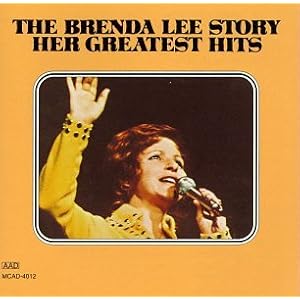 Burton Cummings dreamed of Brenda Lee; he sang about it on Dream Of A Child. That must be worth something.
Burton Cummings dreamed of Brenda Lee; he sang about it on Dream Of A Child. That must be worth something. Wikipedia, more unhelpful than usual, suggests that the Dante of Dante & The Evergreens (real name Donald Drowty) went on post-group to a successful award-winning songwriting career, but it fails to enlighten us further. What songs did he write? He doesn’t even have his own write-up. Google isn’t even helping me on this. So I can’t help you.
Wikipedia, more unhelpful than usual, suggests that the Dante of Dante & The Evergreens (real name Donald Drowty) went on post-group to a successful award-winning songwriting career, but it fails to enlighten us further. What songs did he write? He doesn’t even have his own write-up. Google isn’t even helping me on this. So I can’t help you.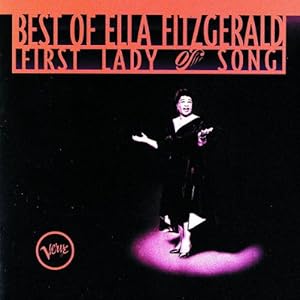 This is an abridged version of a box set called The First Lady Of Song. I did the abridging, and I still have 180 minutes of Ella.
This is an abridged version of a box set called The First Lady Of Song. I did the abridging, and I still have 180 minutes of Ella.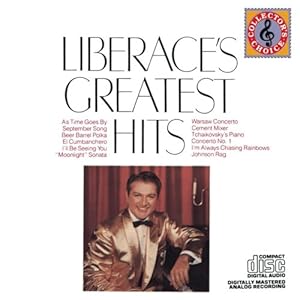 I found both albums, Liberace’s Greatest Hits, and The Best Of Liberace, at Pyramid Records at around the same time, and I couldn’t decide which one to keep, so I kept both, and here they are. The only song that both collections had in common was I’ll Be Seeing You, and one was vocal and one instrumental, so not even that counts.
I found both albums, Liberace’s Greatest Hits, and The Best Of Liberace, at Pyramid Records at around the same time, and I couldn’t decide which one to keep, so I kept both, and here they are. The only song that both collections had in common was I’ll Be Seeing You, and one was vocal and one instrumental, so not even that counts.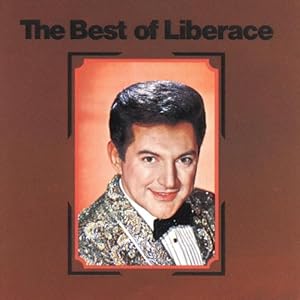
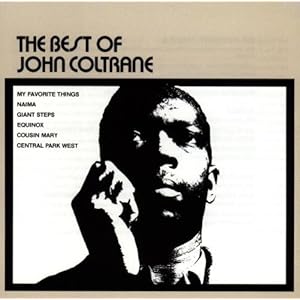 Cassettes were always a bit flaky, even in the predigital age. They were subject to hiss, which was largely, but not entirely, eradicated by the Dolby B noise reduction system, they were subject to (get this) wow and flutter, a term to measure (often not so) miniscule speed variations (as you can guess, wow was when it slowed down, flutter when it sped up), and the mechanism could deteriorate – the tape could tear or get caught in the spindle of the tape deck, the little spongy thing that held the tape in place would come lose, and, if used with equipment that was not maintained properly, the tape would get magnetized and the sound would deteriorate.
Cassettes were always a bit flaky, even in the predigital age. They were subject to hiss, which was largely, but not entirely, eradicated by the Dolby B noise reduction system, they were subject to (get this) wow and flutter, a term to measure (often not so) miniscule speed variations (as you can guess, wow was when it slowed down, flutter when it sped up), and the mechanism could deteriorate – the tape could tear or get caught in the spindle of the tape deck, the little spongy thing that held the tape in place would come lose, and, if used with equipment that was not maintained properly, the tape would get magnetized and the sound would deteriorate.
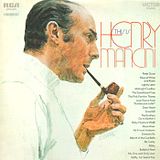 I have a Pink Panther tie. I don’t remember, now, where I bought it. Comic ties were big around 15 years ago, more. The first one I remember seeing was a Mickey Mouse tie worn around the neck of a rather dysfunctional colleague whom I shall refer to as Martin Block. He had bought the tie at Harry Rosen and he paid about $65 for it.
I have a Pink Panther tie. I don’t remember, now, where I bought it. Comic ties were big around 15 years ago, more. The first one I remember seeing was a Mickey Mouse tie worn around the neck of a rather dysfunctional colleague whom I shall refer to as Martin Block. He had bought the tie at Harry Rosen and he paid about $65 for it.

 I like the idea that Buster Brown’s real name was Buster Brown. Whoever wrote the Wikipedia article speculated that it was so. People seem to be able to find these things out; I wonder why the information for Mr. Brown is not available.
I like the idea that Buster Brown’s real name was Buster Brown. Whoever wrote the Wikipedia article speculated that it was so. People seem to be able to find these things out; I wonder why the information for Mr. Brown is not available. The first LP I ever got was The Beatles’ Second Album. One of the tracks was Money (That’s What I Want). I was 7 years old, and I thought that was pretty wild, nestled among all those love songs was a song of what seemed to unmitigated greed, a plain-spoken paean to materialism-on-steroids.
The first LP I ever got was The Beatles’ Second Album. One of the tracks was Money (That’s What I Want). I was 7 years old, and I thought that was pretty wild, nestled among all those love songs was a song of what seemed to unmitigated greed, a plain-spoken paean to materialism-on-steroids.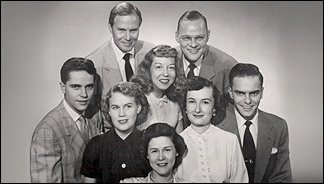

 I happen to own every top 40 recording that Dorsey Burnette did, which is one song, and there are two others that made the hot 100 but not the top 40, and I don’t have those.
I happen to own every top 40 recording that Dorsey Burnette did, which is one song, and there are two others that made the hot 100 but not the top 40, and I don’t have those. How can anyone remember a guy with a name like Jimmy Jones? Maybe that’s why his chart career only lasted about a year, and only 2 of his 4 top 10 records reached higher than number 83, (top 10).
How can anyone remember a guy with a name like Jimmy Jones? Maybe that’s why his chart career only lasted about a year, and only 2 of his 4 top 10 records reached higher than number 83, (top 10). The Dinning Sisters were a recording group who had some hits in the 40s, and they had a brother named Mark, who had 4 top 100 records in the very early 60s, one of which reached number 1 and 3 of which never made it past the top 60. I got his one big hit from the American Graffiti soundtrack, where it sits safely ensconced between Chantilly Lace and Crying In The Chapel.
The Dinning Sisters were a recording group who had some hits in the 40s, and they had a brother named Mark, who had 4 top 100 records in the very early 60s, one of which reached number 1 and 3 of which never made it past the top 60. I got his one big hit from the American Graffiti soundtrack, where it sits safely ensconced between Chantilly Lace and Crying In The Chapel. I no longer have a membership at the CSL Library, and I no longer own a 2003 Montana (or any Montana, or any vehicle). But last winter I had both those things, and I used my library card to borrow The Essential Miles Davis, a 2 CD set featuring highlights of the career of jazz legend Miles Davis.
I no longer have a membership at the CSL Library, and I no longer own a 2003 Montana (or any Montana, or any vehicle). But last winter I had both those things, and I used my library card to borrow The Essential Miles Davis, a 2 CD set featuring highlights of the career of jazz legend Miles Davis.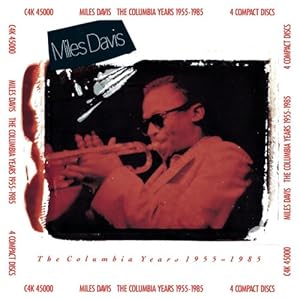
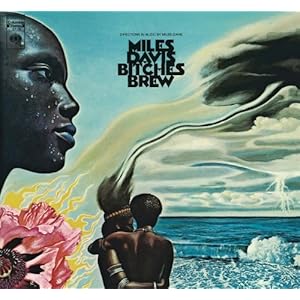
 I was going to write that this is an obscure album by an obscure group, but googling it and finding several references has convinced me otherwise. Apparently Bill Black’s Combo still lives (though I bet you’ve never heard of them) and so does the early 60s best of collection, called Bill Black’s Greatest Hits.
I was going to write that this is an obscure album by an obscure group, but googling it and finding several references has convinced me otherwise. Apparently Bill Black’s Combo still lives (though I bet you’ve never heard of them) and so does the early 60s best of collection, called Bill Black’s Greatest Hits.
